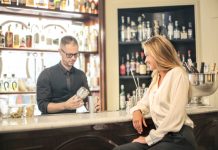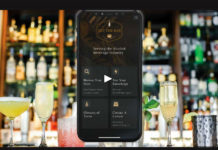In the New York City nightlife game, ambition is a commodity. Like anything else bought or sold on Wall Street, its value is based upon a perceived demand within a given market. Considering the amount of ambition required to open up a 21,000-square-foot bar with a functioning winery, food service, live music, and a gourmet cheese counter, in downtown Manhattan—in the middle of a recession—Michael Dorf’s new City Winery may just have cornered the market.
The impressive and multifaceted City Winery, with all its offerings in entertainment and education, would seem to be a venue that adheres to a standard nightlife rule of thumb for success: give the people what they want. Yet Dorf, in his own words, calls it, “the most self-indulgent project I’ve ever done in my life.” Go figure.
“I’m a selfish [guy],” says Dorf, with a twinge of humor. “And I wanted to create a place that I would want to come, as a patron. I wanted a place where I could listen to music I like, while enjoying high-quality wine in a great wine glass, all in a comfortable environment. I just had to follow through and hope that, if this is working for me, it will work for other people.”
And that approach has worked for Dorf his entire career. In 1986, at the age of 24, he opened the Knitting Factory in New York’s East Village, which essentially complemented his tastes as a young, mid-western native enjoying his first dose of New York City—good beer and loud music. He booked then unheard of bands (Beck, Sonic Youth, The Pixies) that would later become stars, and his business boomed.
In 2002, he sold his equity position and resigned from the Board of the Knitting Factory organization, which by then had come to include multiple Web site ventures, media and promotion companies, and another live music bar in Los Angeles. After leaving, he traveled extensively through Europe, which is where his appreciation of fine wine took root; and back in the states, his brother coaxed him into buying a ton of Napa Valley grapes to produce his first batch of homemade wine. From there, the seeds for City Winery sprouted. Opening officially on New Year’s Eve, December 31, 2008, City Winery is located in downtown Manhattan, steps from the Holland Tunnel entrance, directly above a busy subway line, in an area with relatively little residential real estate—three factors that actually aided Dorf in obtaining the often reclusive beast known as a New York City liquor license.
“I think we were really smart about two things with this location that helped ease the process a bit,” says Dorf. “Opening a winery in New York State is relatively easy—they’re really into it. Getting a liquor license to sell on-premise is much tougher; you have to go through community boards, etc. And in Manhattan, that has gotten harder and harder. Our location is over the Holland Tunnel. There’s not a residence within a block of here. That was a very conscientious decision.”
Along with strategic location, the nature of the venue also simplified the licensing process somewhat.
“We’re certainly not a nightclub—we don’t even need security and it’s a sit-down style environment—but it’s the perception of any kind of large license application that is always negative,” Dorf explains. “So it’s really a challenge, at this capacity, to open in New York. But this neighborhood is perfect, and it really made it easier for us to move forward and get our licenses.”
With a legal capacity of 500, and 21,000 square feet of space spread over two floors, City Winery can be packed, but never feel over-crowded. Such a night could be observed during a recent musical performance, one of many sources of entertainment offered up by City Winery. A sold-out concert by Steve Nieve, longtime pianist with Elvis Costello’s backup band The Attractions, presented a firsthand example of how Dorf’s vision for City Winery was coming to fruition.
 “The idea was to raise the bar on the whole concert-going experience—the cultural indulgence experience, if you will,” says Dorf. “We got the best sound system we could get [Meyer Sound], and the artists are all loving performing here. We’ve sold out every concert we’ve done.”
“The idea was to raise the bar on the whole concert-going experience—the cultural indulgence experience, if you will,” says Dorf. “We got the best sound system we could get [Meyer Sound], and the artists are all loving performing here. We’ve sold out every concert we’ve done.”
And so the truly diverse and ambitious nature of City Winery takes shape, devised in the vein of Dorf’s passions and pastimes. First, there is the winery, which at this very moment is creating house reds and whites in various stages—some being mixed and treated, some already aging in large casks in the sub-level. The winery is available for individuals or groups to invent and develop their own wines, age it, bottle it, design labels, and be part of all the processes along the way. The current economy, however, has caused an understandable fall-off on this side of the business, considering its price point and target audience.
Membership in the winery involves a $5,000 initial fee, followed by approximate costs of $2,000 for grapes and $1,000 for the French oak barrel used in the aging process.
“It’s an $8,000 investment,” says Dorf. “So those 50 original people who bought in were all bankers and service industry folk who just can’t spend money like that anymore. The good news is that [City Winery] gets $8,000 a barrel via that avenue, but $12,000 to $15,000 if we sell our house-made wines at the bar. So it’s just a matter of waiting for it to be ready.”
Of course, what goes better with wine than cheese? The next facet of the City Winery repertoire includes regular wine and cheese pairing events, hosted by connoisseurs from the venerable New York institution known as Murray’s, the city’s oldest cheese shop. The Winery features a deli-style cheese counter with selections from Murray’s, and the combination of wine and cheese plays a large role in the venue’s overall brand. According to Dorf, 75 to 80 percent of the drink orders are for wine.
When it came to getting City Winery running, not everything was coming up rosés. Staffing was a challenge, says Dorf, who called it “the single toughest thing to nail down.” Why? “We want our wait staff to be wine stewards, and have a certain base level of wine knowledge that would be beyond what a regular waiter might have, but not yet at a sommelier level.”
Another challenge, though ultimately rewarding, was for Dorf to enhance the wine-centric experience patrons would have, so he signed an exclusive deal to use only Riedel Glassware for wine service.
“I think it’s evident of what we’re trying to achieve here—a place where you can see a concert and not drink wine from a paper cup,” he says. “We wanted to offer an elegant experience, and not just go with any glassware, but with Riedel; we made a decision to go expensive, with the best crystal in the industry.”
City Winery’s offerings are very competitively priced, ranging from $7 to $15 with some 25 or 30 from which to choose by the glass and another 300 or so by the bottle. A large selection of scotches and cognacs (nearly 50), paired with a slim but respectable beer menu and just two vodkas, emphasizes the demographic Dorf is targeting.
“Our typical customer is a cultural New Yorker who is interested in discovery, ‘hipness,’ and self-improvement, by the fact that there is an educational component on some level,” says Dorf. “I think all of those pieces fit a pretty big swath of a New York audience.”
Look for “How-To: Increase Wine Sales” in the July/August 2009 issue of Bar Business Magazine
_____________________________________________________________________________________________
This summer, City Winery is lending its backyard to the Hudson Square Music and Wine Festival, where every Tuesday evening locals can hang out after work and enjoy live music performances and BBQ (see video below).








